Running your Business - dda
Wages Protection System
The Wages Protection System (WPS) is an electronic system to transfer salaries of employees and workers. It ensures timely and transparent payment of wages to employees in the UAE. All businesses registered with Ministry of Human Resources and Emiratization (MoHRE) must subscribe to the ‘Wages Protection System (WPS)’ and pay the wages to their employees through that system regularly to avoid penalties. WPS requires employers to pay workers' salaries through banks and financial institutions approved by the UAE Central Bank. The system promotes transparency, protects workers' rights, and helps companies comply with labor laws by monitoring salary payments.
Accessing and Updating Business Data
Investors in Dubai can access and update their business data through digital platforms of the government entities. Depending on the business location — whether in Dubai mainland or a free zone — investors can use systems such as the Dubai Department of Economy and Tourism (DET) portal or the respective free zone authority’s online services. These platforms allow business owners to view, modify, and manage their company information, including ownership details, license updates, and activity changes. Access typically requires authentication through the UAE Pass, the national digital identity.
Related Online Services
VAT
Value Added Tax (VAT) is a consumption-based indirect tax applied at each stage of the supply chain, with the final cost borne by the end consumer. In Dubai and the UAE, a 5% VAT is levied at the point of sale, and businesses are responsible for collecting and remitting it to the Federal Tax Authority.
A business must register for VAT if the taxable supplies and imports exceed the mandatory registration threshold of AED 375,000. Furthermore, a business may choose to register for VAT voluntarily where the total value of its taxable supplies and imports (or taxable expenses) is more than the voluntary registration threshold of AED 187,500.
Tourists can claim refund on VAT paid on purchases they made during their stay in Dubai.
Excise Tax
Excise Tax is a form of indirect tax levied on specific goods. These goods are typically those that are harmful to human health or the environment.
Excise Tax is currently applied on the following goods:
Tobacco and tobacco products
Liquids used in electronic smoking devices and tools
Electronic smoking devices and tools
Carbonated drinks (note that this excludes sparkling water)
Energy drinks
Sweetened drinks
Corporate Tax
Corporate tax is a form of direct tax levied on the net income or profit of corporations and other entities from their business. Corporate Tax applies to persons, who have annual income exceeding AED 375,000.
The following persons are exempt from Corporate Tax, either automatically or by way of application:
The UAE Federal and Emirate Governments entities
Wholly Government-owned companies listed in a Cabinet Decision
Businesses engaged in the extraction of UAE natural resources
Public Benefit Entities listed in a Cabinet Decision
Investment Funds
Public or private pension or social security funds
UAE juridical persons wholly owned exempted entities.
Tax on Foreign Banks
Income tax is levied on foreign banks operating in Dubai. Law No. 1 of 2024 concerning Tax on Foreign Banks applies to all foreign banks operating in Dubai, including those in special development zones and free zones, with the exception of foreign banks licensed to operate in Dubai International Financial Centre (DIFC). Read the law Read the law
However, if these banks pay corporate tax in accordance with UAE Federal Laws, the amount of corporate tax will be deducted from their total tax liability.
Was this content helpful

